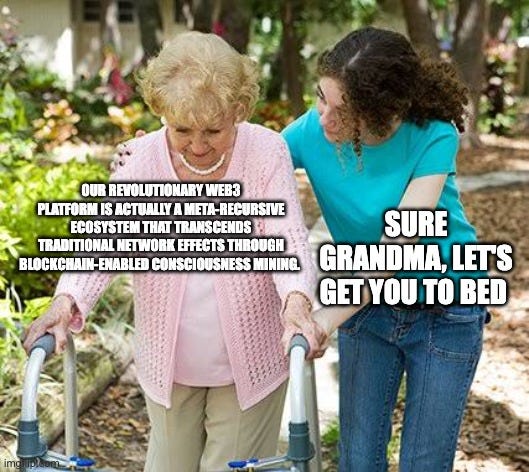- Word for Word
- Posts
- Why Tech Bros Can't Write
Why Tech Bros Can't Write
On Silicon Valley's communication struggles
There's a peculiar silence that falls over a room when a startup founder opens their pitch deck. The air grows thick with anticipation, weighted by the gravitational pull of millions of potential dollars.
That first slide appears, laden with buzzwords that float like debris in the digital ether - "revolutionary," "disruptive," "paradigm-shifting." The collective souls of English teachers everywhere cry out in despair.
I've spent years navigating tech companies, where the architecture is invariably open-concept but the writing can be – ironically – walled off from clarity. The problem isn't merely stylistic. It's cultural. It’s deeply rooted in the soil of Silicon Valley's particular strain of ambition and hyper-confidence.
The Cultural DNA of Bad Tech Writing
The first time I encountered a tech company's "About Us" page that described their product as a "synergistic ecosystem leveraging cutting-edge methodologies," I assumed it was an outlier. Ten years and countless similar encounters later, I've come to understand it as something else. It's a cultural artifact, as telling as the ping pong tables and cold brew on tap.
Tech bros can't write because our tech culture actively rewards opacity. In an industry where complexity is often mistaken for sophistication, clarity becomes almost transgressive. It's not that we don't know better. It's that we’ve been conditioned to believe that simpler means worse.
Consider the typical startup founder: brilliant, ambitious, often deeply technical, and absolutely terrified of appearing simple. They've been shaped by a culture that equates complexity with value. The more complicated your explanation, the more valuable your solution must be; or so the thinking goes. And here come those VC dollars to validate that.
After analyzing hundreds of tech company websites, internal documents, and pitch decks, we can identify some primary patterns that plague tech writing.
First, there’s the addiction to abstractions, in which concrete details are replaced with vague conceptual frameworks. Real problems are obscured behind theoretical solutions. Simple ideas are elevated to philosophical treatises. Everything needs a “vision” and a “mission statement.”
Next, you’ll find a full on jargon shield, wherein highly technical terms are used as social signals rather than clarity tools. Industry buzzwords become protective armor. Complex terminology is deployed as band-aid over not QUITE having found PMF yet.
Lastly, you’ll find instant scale and grandeur. Everything must be "world-changing" from day one. Local solutions are inflated to global proportions, and we narcissistically assume that the universe is our ICP. Modest improvements and feature deployments can be nothing short of revolutionary breakthroughs.
How to Break Free
This condition isn't terminal. Recovery begins by:
1. Embracing concrete pain points
Instead of writing: "Our solution leverages cutting-edge methodologies to optimize user engagement paradigms,” you can just say, "We help people spend less time in meetings and more time doing actual work."
2. Being human
Instead of writing: "Our platform facilitates seamless cross-functional collaboration initiatives," you can just say, "We help marketing teams talk to engineering teams without wanting to throw their laptops out the window."
3. Being brave enough to be simple
Instead of writing: "We're revolutionizing the fundamental architecture of enterprise communication frameworks,” you can just say, "We're making it easier for companies to talk to their customers."
The deeper truth is that bad tech writing stems from fear. Fear of not being taken seriously, fear of not securing funding, fear of being exposed as "too simple." This fear manifests in layers of complexity that act as protective coloring. It doesn’t serve us.
Successful tech companies eventually learn that true innovation doesn't need verbal gymnastics. Google once described its mission as "to organize the world's information and make it universally accessible." No buzzwords, no jargon. Just clarity about what they do and why it matters.
The Grandma Test
Can you explain your idea to your grandma? If not, you probably don’t understand it well enough.

Here’s how to fix it: highlight every industry buzzword in your writing. Replace each one with simpler language, and instantly watch your message become clearer.
The cure for bad tech writing isn't more sophisticated language or better jargon. It's courage. Be clear and say what you mean without hiding behind complexity’s comforting shield. Maybe someone thinks your idea is total shit! Be brave anyway.
In marketing, being overly complicated isn’t a flex. The most powerful ideas in tech history have been expressed simply: personal computers, search engines, social networks. They caught on like wildfire through clarity of purpose and execution.
Imagine how much more we could achieve if we could simply learn to talk about our work in language that actual humans use.
Until then, I'll be here, translating tech-speak into human language, one buzzword at a time. 👋
Don't forget to write. And when you do, don't forget to be human.